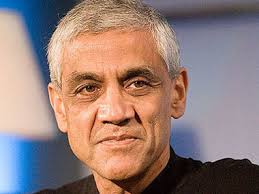This is the third post in my ongoing Series on Technology, Disruption (and Chess). In the previous post I contrasted the old world of closed or hidden knowledge with the new landscape of open knowledge in which we are living. I also described a framework that I think is helpful for entrepreneurs, investors and technologists as they search for opportunities within sectors that have been or are in the midst of being disrupted by technology/software. In this post we will examine the world of venture capital- an industry that is well along in experiencing this phenomenon of "software eating the world". It's being unbundled before our eyes. Here's my effort at describing this evolution, layer-by-layer:
First Layer: VC Bloggers, The Funded
I see the first layer of the 'laying bare of VC by technology' as the phenomenon of VC's actually blogging about their business. This essentially started in 2003 with guys like David Hornik, Naval Ravikant at August Capital and then guys like Fred Wilson and Brad Feld as the pioneers. (Again we see the phenomenon of some of the most respected and talented practitioners having the confidence to embrace change and experiment with new platforms). Venture Hacks (by Ravikant and Babak Nivi) was also excellent but came later. Many followed when it was considered "safer" to blog and they figured their LP's wouldn't incinerate them. As always, the laggards came in at the end when they realized they "needed to blog to exist" and compete- and of course most were terrible at it and just imitating the leaders and often ended up just lazily pimping their portfolio companies. There was also Adeo Ressi's "the Funded" in this first layer- a site that had the nerve to let people rate VC's anonymously. It enraged many a grumpy investor. How dare they! But it was definitely one of many influences on VC behavior that emerged during this new era of "exposure".
So what exactly did those blogging pioneers do? They actually talked explicitly about what they were looking for, what a term sheet was all about, how to get in touch with them, and all the formerly hidden tricks (such as 3x liquidation preferences & taking the option pool out of the entrepreneur's hide) that VC's and their counsel employed so often against uninformed and unprepared entrepreneurs. There was a massive knowledge gap that had been used against entrepreneurs- but the more this knowledge was disseminated during this "First Layer", the more the power dynamics shifted away from the VC's. The "black art of VC" was being 'laid bare' in this sense. And what exactly did this lead to?
Entrepreneurs were no longer in the dark and suddenly knew what the game was. Few before them had ever known.
Low-life VC's asking for 3x liquidation preferences were exposed for what they were and became dinosaurs.
Bad VC behavior was discussed openly on the Web and exploitative, rude, arrogant actors were now exposed.
VC's with no strong voice/perspective on the web languished in obscurity wondering what had happened.
There was a power shift. More power shifted to the entrepreneur (although this was not the only reason for this dynamic).
Second Layer: SuperAngels Emerge
Due to the inexorable advance of technology, the cost of launching companies was dropping precipitously during this time and entrepreneurs no longer needed large checks from VC's to get going. This paved the way for the emergence of the SuperAngel or MicroVC. These investors emerged in great contrast to traditional large funds. Founder-friendly, no board seats needed, easy terms with a "lets do this together mindset". Also, some respected law firms started using their websites to publish standard term sheet templates openly that the industry began to adopt. I see the highlights as follows:
With VC blogging platforms seeding the field, the precipitous drop in costs to launch companies opened-up a 'Second Layer'
A new breed of superangels/microVC's emerged: Kopelman, Clavier, Conway, Ravikant (again!), Senkut, Maples & others
The meme of founder-friendly investors (often entrepreneurs themselves) emerged, open discussions, open personalities, no board seats, friendly terms, convertible notes.
Law Firms start putting out "standard term sheet models" openly and deconstructed the terms to which entrepreneurs were so often oblivious
Third Layer: VC as Service-Provider, the emergence of AngelList, Secondary Markets, Accelerators
Even though some firms had been providing some of these services here and there in the past, First Round Capital and then Andreessen Horowitz took the concept of VC as service-provider to an entirely new level. Using software to streamline the networks of all their portfolio companies was a big start. One CEO could now get instant information about any given problem (s)he had by pinging the system. Andreessen then put this all on steroids by hiring pr/bus dev/finance and other professionals in-house to provide services to their portfolio companies. They have set a standard so far out ahead of anyone else in the field that their fund has become known as one of the best in the world despite having been in existence only for several years.
The JOBS Act has also now enabling true crowdfunding. AngelList (founded by names that should be sounding familiar by now: Ravikant and Babak) is at the forefront of this movement and has become preeminent as the place for early stage investors and entrepreneurs to go for an "online" solutions to raising money. AngelList's Syndicates have now been released which opens up fascinating possibilities. Prominent angels can already "raise" their own mini-venture funds on that platform within days. It's truly a huge shifting of a tectonic plate.
But it must be said- whereas now people are 'suspect' if they don't have an AngelList profile, a few years before this many people thought Naval Ravikant (the CEO) was spinning his wheels or worse. Many people didn't understand what he was talking about and couldn't imagine VC being done via a platform. He kept talking about the "unbundling" of the venture process: capital, advice, referrals, etc. He had already seen "the next layer" before most.
Lastly, in this third wave we saw the emergence of secondary platforms like SecondMarket and SharesPost, companies that emerged to provide liquidity to founders and early employees of companies that had reached escape velocity. I remember how alien this concept (and frankly unpopular in certain circles) seemed when Barry Silbert launched his company. Now these entities seem like long-time fixtures of the venture ecosystem.
Very recently I heard of a company called ExitRound that is attempting to create an anonymous marketplace for founders to discretely "explore acquisition opportunities", (read: acqui-hires). Some people are already questioning the validity of this approach- who's to know if they're right or wrong. There's no question this could become another viable micro-layer in this category.
Fourth Wave (yet to come): An algorithmic approach?
It's my view that the disruption of VC is still in its early innings. And this is an example of where I think we need to be most alert for new developments and opportunities when we look at any industry being re-invented. As an example, Vinod Khosla, tweeted the comment and link below the other day. He's talking about the early frontier of VC's adopting algorithms to help them make their investment decisions and gives several examples of emerging players in that space. His point is that this sort of data-enabled approach will be standard in the future whether people can stomach it now or not.
Vinod Khosla @vkhosla 11/3/13, 12:55 PM
VC in age of algorithms: if algo say's “yes” there’s human screening; VC's subject to a litany of cognitive biases
This is probably going to comprise yet another layer of disruption/innovation to what may or may not be called "venture capital" by then.
Very Speculative: Potential Fifth Wave: Investing in People's future earnings: Athletes, Entrepreneurs, Celebrities
Some entrepreneurs believe they are on the vanguard of creating a new asset class. Upstart and Pave are two players in the early innings of moving entirely beyond funding companies but going right to investing in people themselves. Fantex is another emerging company that allows you to invest in the future earnings of professional athletes. Vernon Davis, pictured above, has recently put 10% of his earnings up into such an investment pool.
I actually think this loan stuff will get destroyed as well. I think that if this is to become a "wave" the cutting-edge stuff two years from now will be just funding people, mentoring them, getting them ultra-networked and sharing in their upside. If they can't pay you back- there will be no consequences. Here again algorithms will be used to identify the best people to back and there will be an ultra-elite layer of human curation on top of it all. I think I know the guy who will make this happen. I was in the same room with him discussing just this today.
Summary
So here is the inexorable advance of technology/software (designed by human innovators of course) doing its thing and running its course in VC. It's opening up and transforming a formerly closed industry. Old players that were taking advantage of entrepreneurs and relying for their livelihood on the information advantage are dying off. New players with 'next-gen' approaches have come-in and eaten up many of the older players. The AngelList platform is now on the cutting edge of what may well be the next wave of change. As mentioned, an investor without an AngelList profile has already become 'suspect' in the same way that a professional without a LinkedIN profile is suspect and perhaps irrelevant.
But to my point earlier- so what? If you are interested in VC or are an angel or VC yourself- or are an entrepreneur looking at this space- what can you derive from this understanding? Where are the "secrets" Thiel has described? Where do the opportunities lie? Where is the hidden knowledge/next opportunity of today and of tomorrow? How can entrepreneurs and investors "roll with this" instead of becoming irrelevant?
Here are some thoughts as to where to look for the Hidden Knowledge- the so-called secrets:
What are the best investors doing to reinvent themselves right now?
Who is generating the best process/manual for judging early stage investment prospects and how?
What will be the key to being able to form and build a great syndicate on AngelList? (Social Algorithms?) :)
How to identify the new breed of low-life investor who uses these platforms? What's the new camouflage they wear?
On the other side- quality investors who didn't have a knack for social media and blogs but were good with entrepreneurs and added massive value are now obscured from view and can only be found through the old ways, ie. practitioners who respect them "bigging-them-up" and making warm intros to them. How to find and identify them?
I have speculated about two subsequent tech/software led waves (four and five above) that may further disrupt the VC industry. Where do you see it going?
Will there be a new breed of superangel that sucks up all the air in the room due to their huge social profiles? Will they emerge from AngelList Syndicates or elsewhere?
Will most funds get raised on AngelList in the future?
With SEC rules loosening how will this transform the fundraising landscape for funds?
As Thiel would put it, where are the remaining hard problems to solve in this space? Are convertible notes on their deathbed? What will the newer structures and instruments look like?
Let me know your thoughts.
















